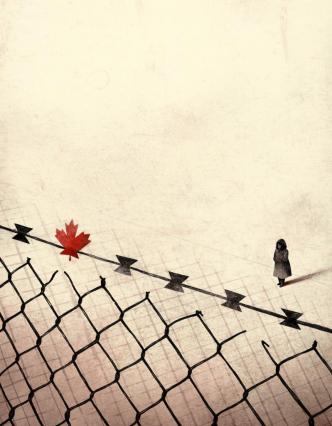Secondary menu
UN Review Should Urge Canada To Reform Immigration Detention System

Joint Submission to UN by Human Rights Groups Says Treatment of Children and Persons with Mental Health Conditions Violates International Obligations
Toronto, October 5, 2017 — A United Nations review of Canada’s human rights record should urge Canada to make concrete commitments to meaningfully address its treatment of vulnerable persons in immigration detention, the International Human Rights Program at the University of Toronto’s Faculty of Law (IHRP) said today.
The IHRP, in conjunction with international and national human rights organizations — including Amnesty International, the Canadian Civil Liberties Association, and Justice for Children and Youth — delivered a joint submission to the UN today stating that immigration detainees, particularly children and non-citizens with mental health conditions, continue to suffer significant human rights violations.
“Canada’s renewed efforts to become a global leader as a multicultural safe haven for refugees and migrants should be applauded, but it needs to move quickly to address the serious human rights violations of some of the most vulnerable members of our society,” said Samer Muscati, director of the IHRP. “It’s time that Canada lives up to its human rights reputation by ending the needless detention of children and migrants with mental health conditions when alternatives already exist.”
In the spring of 2018, Canada will under go its third Universal Periodic Review (UPR) before the UN Human Rights Council in Geneva, in which UN Member States will review past Canadian human rights pledges, and raise new concerns. Through the UPR process, the UN Human Rights Council periodically reviews the human rights progress of each Member State approximately every four years.
The submission criticized Canada for routinely holding non-citizens with mental health conditions in maximum-security provincial jails, and for detaining or “housing” children in detention, or separating them from their detained parents.
Since 2013, more than 800 children have spent time in Canadian immigration detention, including children from Syria and other war-torn regions. According to medical experts, immigration detention causes serious and lasting psychological harm, including depression, anxiety, post-traumatic stress, and suicidal ideation. The submission said that family separation is not an adequate alternative to child detention because it also causes significant psychological distress, and may expose children to the hardships of the child welfare system.
The submission also criticized the Canada Border Service Agency (CBSA) for routinely detaining migrants with mental health conditions or psychosocial disabilities in maximum-security jails — sometimes for years — despite their vulnerable and non-criminal status. In fact, CBSA policy explicitly states that detainees may be transferred from medium-security Immigration Holding Centres to maximum-security provincial jails due to their mental health conditions. CBSA’s treatment of non-citizens with mental health conditions is in breach of Canada’s international human rights obligations, because it is discriminatory, it constitutes indefinite and arbitrary detention, it is cruel and inhuman, and it violates the right to health.
In Canada, there is no legislatively prescribed limit to the length of detention, and as such, detainees have no way to ascertain how long they will spend in detention. The submission says that a needlessly punitive culture persists within the immigration detention system, and it is enabled by a series of systemic issues that must be addressed through legislative, regulatory, and policy reforms.
“Canada’s immigration detention system is broken, and it’s harming vulnerable children and adults,” said Hanna Gros, the primary author of the joint submission. “Canada should stand up for the human rights principles that are at the foundation of our values, and fixing our immigration detention system is a necessary step in that direction.”
As a first step, the human rights organizations are calling on Canada to create a legislative presumption against detention beyond 90 days, and to form an independent body/ombudsperson responsible for overseeing and investigating CBSA to whom immigration detainees can complain. The joint submission also urges Canada to immediately implement community-based alternatives to detention whenever possible, including reporting obligations, financial deposits, and guarantors.
The submission is based on three years of research by the IHRP, which resulted in three reports: “We Have No Rights:” Arbitrary imprisonment and cruel treatment of migrants with mental health issues in Canada (2015); “No Life for a Child”: A Roadmap to End Immigration Detention of Children and Family Separation (2016); and Invisible Citizens: Canadian Children in Immigration Detention (2017).
Other partners in the joint submission are the Canadian Association of Refugee Lawyers, the British Columbia Civil Liberties Association, and the Refugee Law Office of Legal Aid Ontario. Human Rights Watch also endorsed the submission’s recommendations.
The UN established the UPR process in 2006. Countries under review submit written reports on their human rights situation and respond to the questions and recommendations put forward by other UN Member States at the Human Rights Council. All 193 UN Member States undergo these reviews.
This is the IHRP’s second UPR submission. As part of Canada’s second Universal Periodic Review on April 26, 2013, the IHRP submitted a shadow report highlighting rights violations against women with mental health issues imprisoned in Canadian penitentiaries.
Media stories
- "Canada blasted for 'needlessly punitive' immigration detention system" The Toronto Star, Oct. 8, 2017
- "Human rights group urges Canada to stop detaining vulnerable migrants" Canadian Lawyer, Oct. 5, 2017
- "U of T researchers and human rights groups raise concerns with UN on treatment of immigration detainees" U of T News, Oct. 5, 2017
AVAILABLE FOR COMMENT
Toronto
Ottawa
Montreal
Rachel Kronick, Psychiatrist, Jewish General Hospital;Associate Professor, McGill University
Vancouver
Josh Paterson, Executive Director, BC Civil Liberties Association
London, UK
Michael Bochenek, Senior Counsel, Children’s Rights Division of Human Rights Watch
For more information and to arrange for interviews, contact:
Petra MolnarResearch Associate, IHRPUniversity of Toronto, Faculty of Law+1 416-946-8229ihrp.law@utoronto.ca | Lucianna CiccocioppoDirector, External RelationsUniversity of Toronto, Faculty of Law+1 416-946-0334lucianna.ciccocioppo@utoronto.ca |
